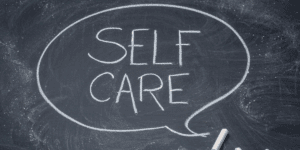Stress Resilience Habits Don’t Need to Take Hours (Or Days)
Wellness Micro Habits That Are As Easy As 1, 2, 3
As we juggle work and life, adding a new challenge each day, it often feels like performing a nonstop multitasking magic trick — you need new tricks and proven tactics to elevate your stress resilience, and ultimately, your overall health and well-being.
These are wellness micro habits: small actions requiring minimal effort, that through time and repetition, evolve into more robust, impactful habits.9 And ultimately, they can add up to significant, positive life changes.
So, if you’re looking to build stress resilience step by step with wellness micro habits, consider the following:
1. Perform a One-Minute Meditation
Considering an hour of meditation every day? Whoa, slow down. Meditation can calm anxiety, alleviate chronic pain, and even put insomnia to sleep — all proven ways to lower stress.11 But start smaller; start with one minute. Simply set your smart phone’s timer for 60 seconds, block out distractions and inner monologue, and instead solely focus on your breathing. Slow and deep, in and out.
2. Rise From Your Chair (At Least) Every Half Hour
Honestly, this second wellness micro habit is even easier than the first. The science that’s been conducted on sitting being unhealthy continues to mount. At the same time, the science demonstrating how even 5-minute breaks from a sedentary position every 30 minutes can counter these effects continues to grow, too.¹² This movement doesn’t need to be blazing through a DIY obstacle course or even doing some core exercises; simply walking around or mere standing can be enough. As an added bonus, getting up from your chair can also mean you’re escaping a screen, which provides additional well-being benefits.
3. Build Meta Awareness
This technique for building stress resilience is a bit different than the others in that it’s less of an intermittent practice and more of a mindset. Meta awareness is a close cousin to mindfulness. It’s the idea that you’re constantly aware in the moment, avoiding the ingrained quick dopamine fixes; for example, catching yourself before doom-scrolling on your phone. The more you practice meta awareness, the more likely you are to push impulses aside and consciously approach every moment of the day with thoughtful intention.13
4. Make Nature Second Nature
Nature doesn’t require elaborate preparation. Even small, effortless excursions can refresh your mind and lift your spirits. In fact, a slew of studies have revealed that spending as little as 10 minutes outside — getting the mail, walking the dog, or simply checking the progress of your compost pile — can improve psychological and physiological well-being, keeping stress at bay.14
Build Long-Term Stress Resilience Through Micro-Habits with Truvaga
Now that you have a better idea about how wellness micro habits can help build stress resilience, no matter how full your calendar or brain may be with the details of the day, it’s easy to spot apt additions to your toolbox.
Truvaga’s handheld vagus nerve stimulators are designed to put your body, in particular your nervous system, in balance. That means making sure you’re actually relaxed when it’s time to be relaxed, and not wondering why your heart is racing, your senses are stuck on high alert, and the stress is inescapable.
And we believe you’ll find that Truvaga checks a lot of the boxes of an ideal wellness micro habit, including being:
Fast: With convenient, 2-minute sessions you’ll fly through your morning and nighttime routines without missing a beat.
Effective: Truvaga’s clinically studied technology is backed by robust research demonstrating a reduction in stress, improved sleep, restored calmness, and boosting clarity — among other benefits.15
Small and Portable: Both Truvaga vagus nerve stimulator models are easy to take on the go and stow as needed.
On top of those benefits, Truvaga’s ease of use makes it the ideal micro wellness habit to stack with other stress resilience practices. This habit stacking refers to the convenience of combining multiple healthy habits that go together. For example, a Truvaga session, drinking a glass of water, and writing for a few minutes in your gratitude journal make for an effective and efficient wake-up ritual or nightcap.
Small Steps, Big Resilience
Stress resilience is a big deal, but it doesn’t mean that you need to dedicate big chunks of your valuable time to managing it each day. With wellness micro habits, chief among them regular Truvaga usage, you can nickel and dime your way to more stress-free living, and even better, overall elevated health and well-being. Take the first small step today by making Truvaga part of your right-sized gameplan for building a better you.
Sources:
- Peng, M. (2024, March 10). How ‘Time Poverty’ at Work Makes You Less Healthy. Time. https://time.com/charter/6899200/how-time-poverty-at-work-makes-you-less-healthy/
- American Psychological Association. (2022, September 7). How to spend your time more wisely, with Cassie Holmes, PhD [Audio podcast episode]. In Speaking of Psychology. American Psychological Association. https://www.apa.org/news/podcasts/speaking-of-psychology/time
- American Psychological Association. (2024, October 1). Stress in America™ 2024: A Nation in Political Turmoil [Report].https://www.apa.org/pubs/reports/stress-in-america/2024
- Kubala, J., & Jennings, K.-A. (2025, February 3). 16 simple ways to relieve stress and anxiety. Healthline. https://www.healthline.com/nutrition/16-ways-relieve-stress-anxiety
- Edwards, M. K., & Loprinzi, P. D. (2018). Experimental effects of brief, single bouts of walking and meditation on mood profile in young adults. Health Promotion Perspectives, 8(3), 171–178. https://doi.org/10.15171/hpp.2018.23 (PMCID: PMC6064756; PMID: 30087839)
- University of Southampton. (2024, August 23). Just ten minutes of mindfulness daily boosts wellbeing and fights depression – study reveals [News release]. https://www.southampton.ac.uk/news/2024/08/just-ten-minutes-of-mindfulness-daily-boosts-wellbeing-and-fights-depression-study-reveals.page
- Mayo Clinic Staff. (2025, March 26). Exercise and stress: Get moving to manage stress. Mayo Clinic. https://www.mayoclinic.org/healthy-lifestyle/stress-management/in-depth/exercise-and-stress/art-20044469
- American Heart Association. (2024, January 19). American Heart Association recommendations for physical activity in adults and kids [Web page]. American Heart Association. https://www.heart.org/en/healthy-living/fitness/fitness-basics/aha-recs-for-physical-activity-in-adults-and-kids
- UR Medicine Employee Assistance Program. (2024, May 16). Achieve more with micro habits. University of Rochester Medical Center. https://www.urmc.rochester.edu/eap/news-and-events/blog/may-2024/achieve-more-with-micro-habits
- Nawaz, S. (2020, March 2). Focus on “microhabits” to change your behavior. Harvard Business Review. https://hbr.org/tip/2020/03/focus-on-microhabits-to-change-your-behavior
- Kaiser Permanente. (2025, February 17). Quick stress-relief techniques for busy days. https://healthy.kaiserpermanente.org/southern-california/health-wellness/healtharticle.quick-ways-to-relax-and-destress-throughout-the-day
- Largeman-Roth, F. (2025, June 23). These 10 tiny habits can make a big difference in your health—starting today. Real Simple. https://www.realsimple.com/microhabits-for-better-health-11759744
- Knight, R. (2025, February 4). 7 habits to stay focused in a world full of distractions. Harvard Business Review. https://hbr.org/2025/02/7-habits-to-stay-focused-in-a-world-full-of-distractions
- Meredith, G. R., Rakow, D. A., Eldermire, E. R. B., Madsen, C. G., Shelley, S. P., & Sachs, N. A. (2020). Minimum time dose in nature to positively impact the mental health of college-aged students, and how to measure it: A scoping review. Frontiers in Psychology, 10, 2942. https://doi.org/10.3389/fpsyg.2019.02942
- Nonis, R., D’Ostilio, K., Schoenen, J., & Magis, D. (2017). Evidence of activation of vagal afferents by non-invasive vagus nerve stimulation: An electrophysiological study in healthy volunteers. Cephalalgia, 37(13), 1285–1293. https://doi.org/10.1177/0333102417717470






